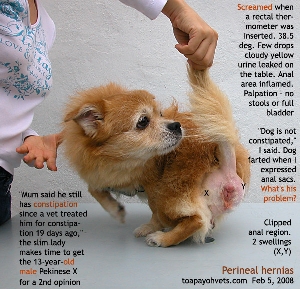 I hope the 2nd year vet student from Murdoch University
learnt some anatomy from his observation of this surgery and
find his anatomy of the canine back area more alive and
interesting.
Anatomy is such a dull subject in 2nd year as cadavers
are life-less and blood-less. The
Pekinese X Pomeranian was said to be 13 years old. The
dog was being looked after by the mother.
The married daughter in her late thirties consulted a
vet as her mother was worried about the dog being
"constipated."
She waited patiently and did not show an angry face as
she sought a second opinion from me. A
soft spoken and gentle serene looking woman.
The
first vet treated the dog for constipation some 19 days
ago. Yet the mother still complained about the dog
having constipation. This dog had a full coat and the
backside swelling was not obvious. Palpation of the
abdomen was empty and so I declared confidently: "No
constipation."
"Why does my mother complain about "constipation?" the
daughter asked.
"My
mum said that the dog had difficulty in pooping," the
gentle lady repeated herself. So, something must be
wrong.
Taking the rectal temperature is a routine in such cases
though the dog had an excellent appetite. The dog "yee
yee" as if he was in pain. A strong gas shot out from
the rectum fouling the air when his anal sacs were expressed.
Abnormal behaviour.
Why would a dog fart so vigorously and loudly when he
had no constipation?
So, I examined the anal region for wounds. As there was
too much hair, the clipper shaved off the area.
The huge right perineal swelling manifested! There was
also a small left perineal hernia! Inside the right
swelling, hard faecal lumps could be felt. Fluid too.
When pressed, the lump disappears and this impressed
anybody as it was like magic - "Here now and gone with a
press of the finger"
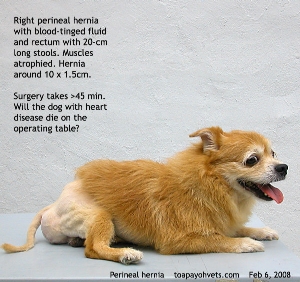 "Your
dog has a perineal hernia,"
I said to the serene lady. "The rectum has diverted and
turned into this swelling. So the dog had difficulty in
pooping. Probably had some problems peeing if the
bladder gets trapped inside this perineal hernia." "Your
dog has a perineal hernia,"
I said to the serene lady. "The rectum has diverted and
turned into this swelling. So the dog had difficulty in
pooping. Probably had some problems peeing if the
bladder gets trapped inside this perineal hernia."
The sole complaint was constipation.
"What should I do? " the lady asked as I told her that
the old dog also had heart disease. He might die on the
operating table as the heart failed. It would be a long
operation lasting more than 45 minutes.
"You have to take the anaesthetic risk," I said. "If the
dog can't poop, he will also die a painful death as the
stools jam up and the toxins accumulate in his body."
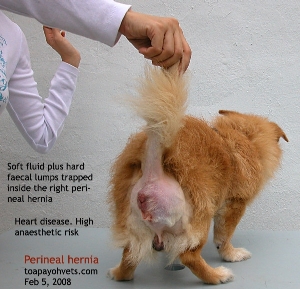 The lady decided on surgery the next day. It would be
Chinese New Year's eve. The vet student would be coming
in the afternoon at around 3 p.m and I wanted to bring
anatomy alive for him. Perineal hernia repairs are rare
occurrences and he might not see another one during his
undergraduate years. I wanted to show him the canine
backside anatomy in a live dog. The lady decided on surgery the next day. It would be
Chinese New Year's eve. The vet student would be coming
in the afternoon at around 3 p.m and I wanted to bring
anatomy alive for him. Perineal hernia repairs are rare
occurrences and he might not see another one during his
undergraduate years. I wanted to show him the canine
backside anatomy in a live dog.
He had a dead dog in the University shared by 4
veterinary students to learn about anatomy in Murdoch
University. But nothing can be so fascinating as a live
demonstration, in my opinion.
This was Chinese New Year's eve. A Golden Retriever with
diarrhoea came in at 3 pm. The owner could not locate
the Surgery although she was supposed to be in before
2.30 pm. So I could not operate at 3 pm.
I had the reunion dinner to attend at 6.30 pm and I did
not want to be late as there is the "mingling of raw
fish and vegetables" for good luck and every member of
the family must be present to do it.
The dog was operated past 4 p.m. The two sides of the
skin cut were retracted by forceps and the student saw a
lot of blood tinged fluid and gel and some pieces of
yellow fat on exposure. This fluid was drained.
I showed the student the muscles but I doubted he could
see them or name them. I had briefed him the anatomy of
the backside before the surgery using the text book.
He has an excellent photographic memory. But how to
motivate a student about backside anatomy?
I pushed back the hernia sac into a big gap of over 10
cm long and 1.5 cm wide. "Pelvic diaphragm" I pointed to
the muscle defect. I doubted he understood. The whole
surgical area was a bloody red area.
"Do you know what a diaphragm is?" I asked him. He knew
about the diaphragm which is a muscle separating the
lungs from the stomach area. But hell, what is a pelvic
diaphragm?
"These are the anal sphincter muscles" I pointed my
forceps to the prominent encircling rings around the
anus. These were visible to him. A large blob of fat
floated out of the hernia. I removed it.
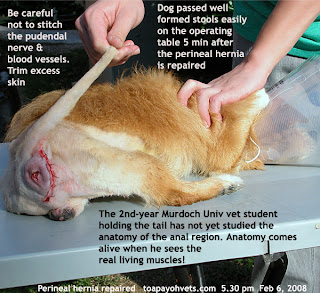 "Look, these
are the coccygeal and internal obturator muscles. They are
atrophied unlike the beautiful illustrations in the Vet
Surgery book," I commented as I sutured the muscles. "Look, these
are the coccygeal and internal obturator muscles. They are
atrophied unlike the beautiful illustrations in the Vet
Surgery book," I commented as I sutured the muscles.
It would be some years before this young man will see another
perineal hernia repair. The dog was able to poop without
problems the next 3 days and sent home to save on
veterinary boarding expenses.
I reminded the owner to keep the Elizabethan collar on
as the dog was discharged without the collar. Small
omissions from my personnel made me angry as the dog may
lick and open up the big wound. Somehow the person seems
to think that there is no need to use the e-collar. I
empahsized to the lady that the dog had to be confined
for at least 7 days. No jumping around.
Now, there is the left perineal hernia which seems to
swell and disappear now and then. The owner had been
informed.
I advised neutering the dog some time later as the male
hormone seem to be a cause of the hernia formation
according to the book. I don't know whether she would
remember as she does not live with the dog.
I did not neuter the dog at the same time as I wanted to
shorten the anaesthetic time so as to be successful in
bringing out a live dog at the end of surgery. The
perineal surgery took more than 45 minutes.
The dog was given 8% gas and then maintained at 2%. For
a short while there was some movement and he was given
2.5%. Other than that anaesthesia was surprising smooth
flowing as if the dog had a nice nap. Without
tranquilisers given as I did not want the heart to be
affected. No pain killers were given after surgery as
these depress the breathing system too. This dog
recovered the next day uneventfully.
It was extremely kind of the daughter to take the time
to bring her mother's dog to the vet before it was
too late. Before the dog collapsed and becomes toxic and
so sickly that the anaesthetic risk increases from the
40% to zero percentage of survival on the operating
table!
A gentle dog owner is always much appreciated by any
veterinarian. Vets will encounter nasty litigious
pushy ones who think that "customer is always right and their cash is
the king". It is always pleasant to operate on the
dog whose owner is "kind to the vets".
No vet can have all gentle clients all the time! But
this case was a pleasant and happy case and the dog did
not die on the operating table. He went back to a happy
aged mother who must have loved him very much as to
pester
the daughter to take him to the vet for further treatment
after 19 days of "constipation."
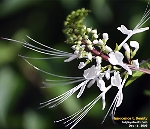 As for the young vet student, he has
3 more years to go. I
hope he would be inspired to excel in veterinary anatomy
in Murdoch University by studying hard and become a very
good veterinarian. As for the young vet student, he has
3 more years to go. I
hope he would be inspired to excel in veterinary anatomy
in Murdoch University by studying hard and become a very
good veterinarian.
UPDATE IN JUN 21, 2010. I have not seen the dog
since the perineal hernia repair in 2008 and I presume
that everything has been OK after the surgery. |
 TOA
PAYOH VETS
TOA
PAYOH VETS TOA
PAYOH VETS
TOA
PAYOH VETS